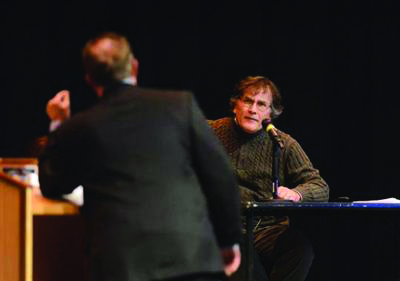

By Max Blechman | The Duquesne Duke
The director of Duquesne’s Center for Environmental Research has recently been called upon to testify as an expert in recent debates and lawsuits regarding natural gas fracking in Pennsylvania communities.
John Stolz, who has done extensive research on the chemical effects of fracking in Western Pennsylvania, testified as an expert on ground water contamination in a lawsuit in Allegheny Township recently and has been involved in other research on the effects of fracking in Butler county well water.
In the recent Allegheny Township lawsuit, Stolz was called to testify on the effects of fracking in communities, but found himself dismissed by lawyers for not being a true “expert” due to his background as a geo-microbiologist. Despite his expertise on the subject, he was asked about zoning issues and grilled by gas company lawyers, an experience he described as “outside of [his] comfort zone.”
“I’ve been told by the lawyers in these lawsuits that I’m not an expert in these zoning issues,” Stolz said. “But the bottom line is that [contamination has] happened, and the common denominator is the fact that they put those wells in.”
Fracking is the process of using high-pressure insertions of water to break up rock formations underground in order to more effectively drill for natural gas.
According to Stolz, this process can involve water being 5,000 feet underground at 3,000 gallons per minute in order to free up gas formations, sometimes resulting in the escape of other present gasses and chemicals buried in the ground.
This process has been scrutinized recently due to contaminations of water supplies in residential and agricultural areas, leading to lawsuits. The effects of this contamination can include the release of methane into water wells, which can result in flammable water in homes. This issue has resulted in an explosion in the water well of one Butler County home.
While the fracking process does have precautions that are meant to prevent this sort of contamination, Stolz said the industry standard for failure is approximately 5 percent of all wells. With more than 8,000 wells drilled in Pennsylvania, the likelihood of failure in any given area is statistically probable.
Fracking can happen in areas directly adjacent to residential areas, often pulling natural gas from underneath the homes of hundreds of low-income citizens, who are put into this situation because they often do not have gas and mineral rights to their properties and are unable to hire the proper legal consultants to prevent the drilling.
Stolz said that while fracking can be an effective method of drilling for natural gas, there needs to be new regulations on zoning and more transparency from the corporations involved.




